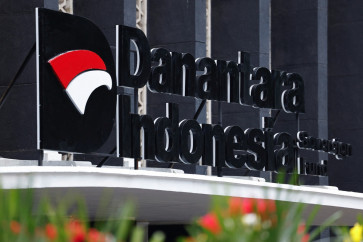Popular Reads
Top Results
Can't find what you're looking for?
View all search resultsPopular Reads
Top Results
Can't find what you're looking for?
View all search resultsComposition in UNSC no longer relevant
Indonesian President Susilo Bambang Yudhoyono reiterated his criticism of the UN Security Council (UNSC), which he deemed had failed to help end conflicts around the world, including the civil war in Syria
Change text size
Gift Premium Articles
to Anyone
I
ndonesian President Susilo Bambang Yudhoyono reiterated his criticism of the UN Security Council (UNSC), which he deemed had failed to help end conflicts around the world, including the civil war in Syria.
He urged the UN to review the composition of the council as well as it’s power distribution, a reiteration of Indonesia’s stance in pushing for the council’s reform.
“World peace should not be determined by only one country among the five veto holders within the Security Council. I suggest that the council be reviewed because it is no longer relevant to the current world situation,” the President said on Friday during a wrap-up of his one-week state visit.
“We can see it everyday, with our own eyes, what has been happening in Syria. Adults and children, males and females, have fallen victim to the prolonged war. But peacemaking efforts and other proposed peaceful resolutions frequently met vetoes at the council,” Yudhoyono said.
“I have also conveyed my view on this and my disappointment of the Security Council’s failure [in the Syria case] to Russian President Vladimir Putin and US Secretary of State Hillary Clinton,” he added.
The Security Council is one of the principal arms of the UN and is charged with the maintenance of international peace and security.
The 15-member council includes the five veto-wielding permanent members of China, France, Russia, the United Kingdom and the United States — based on the victors of World War II — and 10 elected non-permanent members, each with two-year terms.
Malaysia’s Foreign Affairs Minister Anifah Aman said his country was focusing more on what he characterized as the failures of the council.
He addressed the topics of UN reform and the rule of law while also commenting on the Israeli–
Palestinian conflict and the question of Palestinian membership of the UN.
“This is just one of a host of reasons why the UN, especially the Security Council, needs to be reformed,” he said.
Cambodia’s Deputy Prime Minister Hor Namhong said the G20 had a “crucial role” to play in meeting a series of global challenges, among them rising oil and food prices, while noting that a more empowered General Assembly could play a “leading role” in addressing the world’s problems.
“The reform of the UN will no doubt render it more effective in the preservation of international peace, security and stability, as well as in the realization of justice in the international economic system,” said Deputy Prime Minister Hor, who also serves as his country’s minister of foreign affairs and international cooperation.
Singaporean Foreign Affairs Minister K. Shanmugam cited the G20 as one of the “smaller and exclusive groups”, beyond the UN, to which countries had turned because of a “growing frustration” over the inability of existing multilateral institutions to deal with various global challenges, among them rising income disparities, climate change and food security.
German Foreign Minister Guido Westerwelle criticized the role of the Security Council, saying it must adapt to a dynamic and changing world. “We will weaken the Security Council if we fail to adapt it to today’s world.”
The call was echoed by Netherlands Foreign Minister Uri Rosenthal who noted that emerging powers “rightly ask for more influence referring to new political and economic realities”.
The problem in Syria is being cited by many countries as a wake-up call for the UN. Resolutions to address the Syrian situation have twice been vetoed in the past year, most recently in July.
“Syria has demonstrated how arcane the council is and how out-of-tune it is with the needs of the modern world,” said Iceland’s Foreign Minister Össur Skarphéðinsson.
The European ministers were among scores of world leaders and other high-level officials presenting their views for reform.










